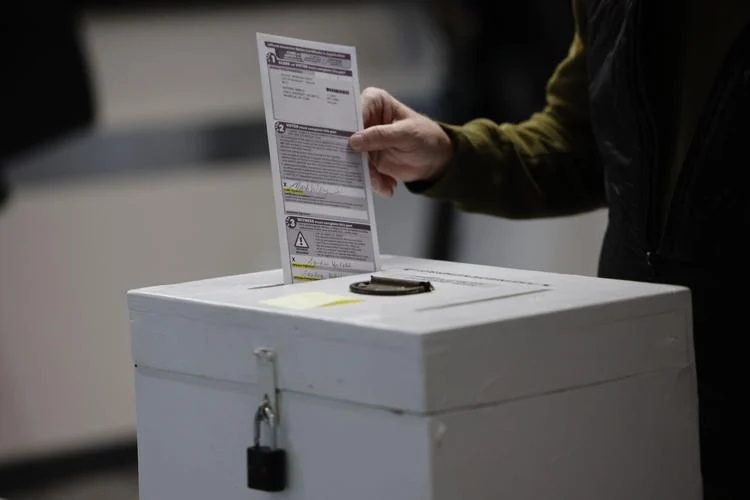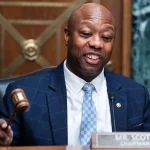Trump’s Voting Order Sparks Fears Ahead of 2026 Elections
This blog delves into President Trump’s recent executive orders targeting voting rights, analyzing the implications as warned by elections expert Marc Elias. We discuss potential legal battles, voter reactions, and the broader impact on U.S. democracy.
In a world increasingly shaped by political maneuvering, the very idea of canceling elections seems unfathomable yet tantalizing for some. After recent comments by Donald Trump, I couldn’t help but reflect on an old saying: where there’s smoke, there’s fire. And in this case, that smoke is billowing from an executive order aimed at voter rights, which could ignite a significant legal battle leading up to the 2026 elections.
The Executive Order: A Closer Look
Overview of Trump’s New Executive Order
Recently, former President Donald Trump announced a new executive order that has stirred significant controversy. This order is primarily focused on voting rights, a topic that has been at the forefront of American politics in recent years. Many view this move as a direct challenge to the integrity of the electoral process.
Trump’s executive order aims to implement stricter regulations around voting. While the specifics are still unfolding, it is clear that this initiative seeks to reshape how elections are conducted in the United States. The implications of such changes could be profound, affecting not just the mechanics of voting but also the very essence of democracy.
Implications for Current Voting Rights
The implications of this executive order are vast. Critics argue that it poses a serious threat to voting rights. Marc Elias, an elections expert and founder of Democracy Docket, stated,
“This is a five alarm fire for democracy.”
His words highlight the urgency and seriousness of the situation.
Many fear that the order could lead to disenfranchisement of voters, particularly among marginalized communities. Stricter voting regulations often disproportionately affect those who already face barriers to voting. This could lead to a significant drop in voter turnout, which is alarming for a democratic society.
Analysis of How These Changes Could Affect the Electoral Process
How will these changes affect the electoral process? The potential outcomes are concerning. For one, if the executive order is implemented, it could lead to confusion among voters. Changes in voting procedures can create uncertainty. Voters may not know where or how to cast their ballots. This confusion can discourage participation.
Moreover, the executive order could provoke legal challenges. Elias has indicated that Trump will likely face lawsuits over this order. Legal battles could further complicate the electoral landscape. If courts intervene, it may delay the implementation of new voting laws, creating a chaotic environment as elections approach.
Context of the Executive Order
Understanding the context of this executive order is crucial. The political climate in the U.S. has been charged, especially following the 2020 presidential election. Many believe that Trump’s actions are a response to perceived threats against his political legacy. By pushing for this order, he may be attempting to solidify his base and assert control over the electoral narrative.
Expert Analysis on Expected Outcomes
Experts are divided on the potential outcomes of this executive order. Some believe it could lead to a significant overhaul of voting laws, while others argue that it may face substantial pushback from state legislatures. The latter could result in a patchwork of voting regulations across the country, further complicating the electoral process.
As the situation develops, it will be essential to monitor how state legislatures respond. Will they embrace the changes, or will they resist? The answers to these questions could shape the future of voting in America.
Potential Responses from State Legislatures
State legislatures play a critical role in the implementation of any new voting laws. Some states may choose to adopt the changes proposed by Trump, while others may reject them outright. This could lead to a significant divide in how elections are conducted across the nation.
For instance, states with Democratic leadership may push back against stricter voting measures, citing the need to protect voter rights. Conversely, Republican-led states may embrace these changes, arguing they are necessary for election integrity. This division could create a volatile political landscape as the 2024 elections approach.
Projected Effects on Voter Turnout
While the date of the executive order announcement is still to be announced, the projected effects on voter turnout are already a topic of discussion. If voter access is restricted, turnout could plummet. Historically, higher voter turnout is associated with more inclusive voting practices. Therefore, any move to limit access could have dire consequences for democracy.
As the nation grapples with these developments, one thing is clear: the stakes are high. The future of voting rights in America hangs in the balance, and the implications of Trump’s executive order will be felt for years to come.
Reactions from the Public and Experts
Public opinion on voting rights has become a hot topic in recent years. With the rise of various tactics aimed at influencing voter turnout, many are left wondering: what does this mean for democracy? President Donald Trump’s recent actions have stirred significant reactions from both the public and experts alike.
Public Opinion on Voting Rights and Trump’s Tactics
Many citizens are deeply concerned about the implications of Trump’s tactics. Polling data indicates that a significant percentage of voters are worried about voter suppression. While the exact numbers are still pending, it’s clear that the sentiment is palpable. People are asking themselves: are their rights being threatened?
- Public sentiment remains divided on Trump’s approach to voting rights.
- Concerns about voter suppression tactics are growing.
- Many citizens feel that their voices may be silenced.
Political activist Marc Elias has voiced strong opinions on this matter. He stated, “There’s no question that 2026 is under attack.” This statement resonates with many who fear that upcoming elections could be compromised. It raises a crucial question: how far will these tactics go?
Experts Weigh in on the Potential Consequences
Experts in the field are not holding back either. They are analyzing the potential consequences of Trump’s executive order targeting voting rights. Many believe that these actions could lead to a significant decline in voter turnout. This is alarming, as it could fundamentally alter the landscape of American democracy.
One expert noted, “Voter suppression tactics, whether blatant or covert, are a reality we must combat.” This statement highlights the urgency of the situation. If voters feel disenfranchised, they may choose not to participate in elections. This could lead to a dangerous precedent where only a select few have a say in the democratic process.
Grassroots Movements Reacting to Changes
In response to these developments, grassroots movements have sprung up across the nation. Activists are mobilizing to combat voter suppression and advocate for fair voting practices. They are organizing rallies, creating awareness campaigns, and pushing for legislative changes. The energy is palpable, and many are asking: what can we do to protect our rights?
- Grassroots organizations are gaining momentum.
- Activists are calling for transparency in voting processes.
- Community engagement is crucial for mobilizing support.
These movements are essential in the fight against voter suppression. They serve as a reminder that democracy is not a spectator sport. It requires active participation from all citizens. As one activist put it, “We must stand together to ensure that every voice is heard.”
Polling Data on Voter Sentiment
While specific polling data on voter sentiment is still to be announced, the general consensus is clear: people are worried. They are concerned about the integrity of their votes and the future of elections in the United States. This anxiety is not unfounded; it stems from a growing awareness of the tactics being employed to influence voter behavior.
Expert Predictions on Voter Turnout
Experts are predicting that if current trends continue, voter turnout may decline significantly. This could have dire consequences for the democratic process. If fewer people vote, the outcomes may not accurately reflect the will of the people. This raises an important question: how can we ensure that every voice is counted?
As the debate continues, it’s clear that both public opinion and expert analysis will play a crucial role in shaping the future of voting rights in America. The stakes are high, and the conversation is just beginning. With grassroots movements gaining traction, it remains to be seen how these dynamics will unfold in the coming years.
What Lies Ahead for the 2026 Elections
The 2026 election year looms, bringing with it high stakes and potential for significant change. As the political landscape shifts, many are left wondering what the future holds. What challenges will arise? How will voters respond? These questions are crucial as we look ahead.
Predictions for the Legal Landscape
One of the most pressing concerns is the legal landscape surrounding the upcoming elections. With recent executive orders targeting voting rights, experts predict a wave of court cases. Attorney Marc Elias, a prominent figure in election law, has stated, “There’s no question that 2026 is under attack.” This sentiment reflects a growing anxiety about the integrity of the electoral process.
Legal challenges are expected to unfold from 2024 to 2026. These cases may stem from various sources, including state-level changes to voting laws and executive actions. The implications of these challenges could be profound. They may not only affect the outcome of the elections but also shape public perception of the electoral process.
Possibility of Court Challenges and Political Repercussions
As the legal battles commence, the potential for court challenges is significant. These challenges could arise from both sides of the political spectrum. For instance, if new voting restrictions are enacted, civil rights groups may file lawsuits to protect voter access. Conversely, if voter fraud allegations surface, there may be legal actions aimed at tightening regulations.
The political repercussions of these challenges could be far-reaching. They may lead to increased polarization among voters. Some may feel empowered to advocate for their rights, while others may become disillusioned with the electoral process. The outcome of these court cases will likely influence voter turnout and engagement.
Strategies for Voters to Stay Informed and Engaged
In this tumultuous environment, it is essential for voters to stay informed. Here are some strategies to help navigate the complexities of the upcoming elections:
- Follow Reputable News Sources: Stay updated on changes in voting laws and court rulings. Reliable news outlets can provide timely information.
- Engage with Local Advocacy Groups: Many organizations focus on protecting voting rights. Joining these groups can provide valuable resources and support.
- Participate in Community Discussions: Engaging in conversations about voting rights can help raise awareness and mobilize efforts to protect them.
- Educate Yourself on Voting Procedures: Understanding how to vote, including registration and polling locations, is crucial. Knowledge is power.
By taking these steps, voters can advocate for their rights and ensure their voices are heard. As Marc Elias emphasized, “Election integrity is paramount; we must remain vigilant.” This vigilance is key to safeguarding democracy.
The road to the 2026 elections is fraught with uncertainty. Legal challenges are expected to shape the electoral landscape, and the political repercussions could be significant. However, voters have the power to influence the outcome. By staying informed and engaged, they can advocate for their rights and contribute to a fair electoral process. As the stakes rise, it is crucial to remember that every voice matters. The future of democracy depends on it.
TL;DR: Trump’s new executive order on voting rights, warned by expert Marc Elias, raises concerns about potential legal ramifications as 2026 elections approach.
ExecutiveOrdersImpact, DemocracyDocket, PoliticalStrategy, U.S.Elections, TrumpVotingRights, MarcElias, ElectionTactics2026, VoterSuppression, LegalChallengesTrump voting order, 2026 elections, voter suppression, election integrity, executive order voting rights, Marc Elias, U.S. democracy, voting law changes, legal challenges elections, voter turnout impact
TrumpVotingRights, #U.S.Elections, #PoliticalStrategy, #VoterSuppression, #LegalChallenges, #MarcElias, #ElectionTactics2026, #DemocracyDocket, #ExecutiveOrdersImpactTrump2026 #VotingRights #ElectionIntegrity #MarcElias #VoterSuppression #ExecutiveOrder #USPolitics #DemocracyInCrisis #LegalBattle #CivicEngagement


